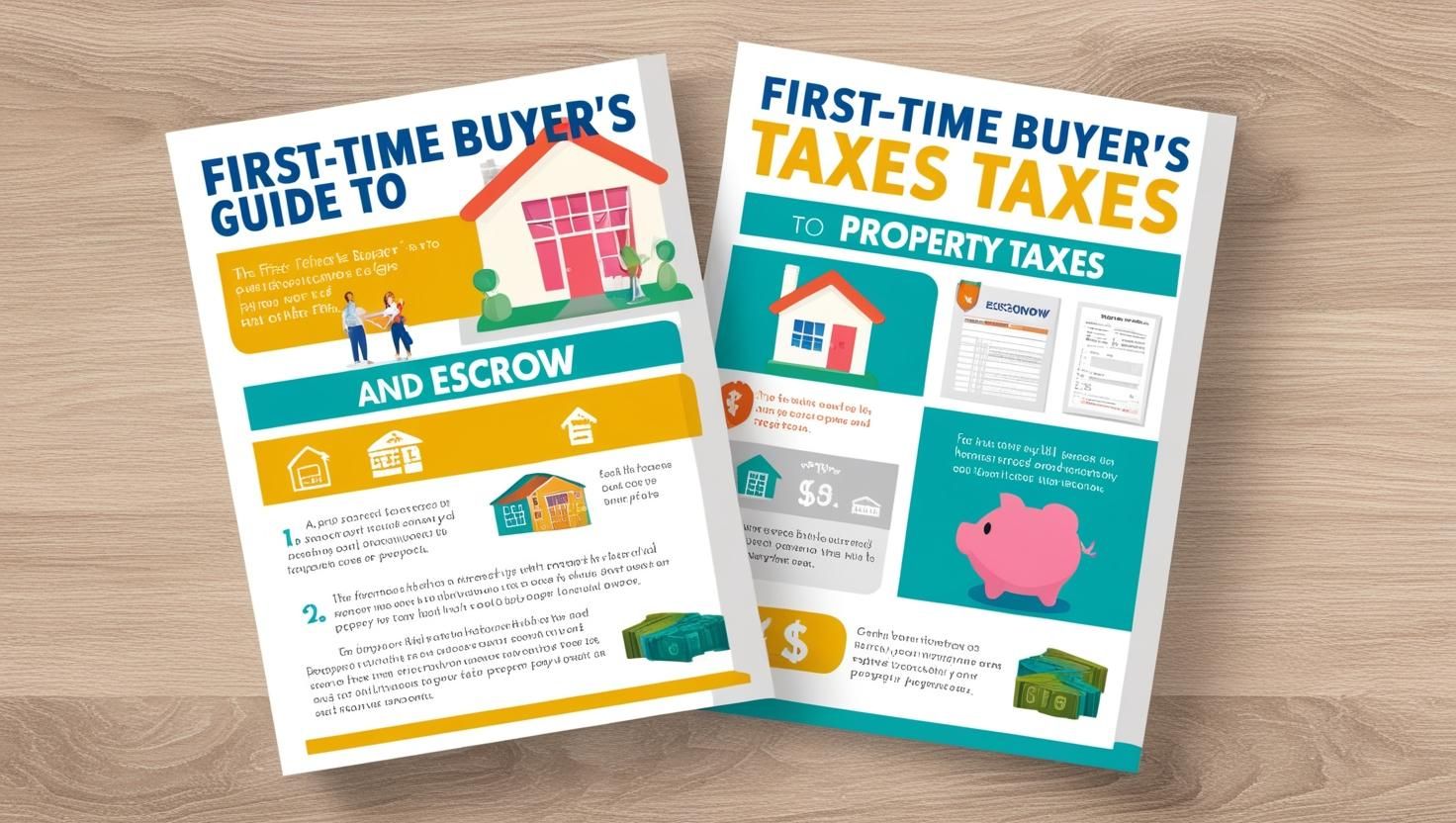The First-Time Buyer’s Guide to Property Taxes and Escrow

The First-Time Buyer’s Guide to Property Taxes and Escrow

When you're buying your first home, there's a lot to learn. Between finding the perfect property and navigating mortgage options, it can feel like a whirlwind of decisions. But one of the most important, and often confusing, aspects of homeownership is understanding property taxes and escrow. In this guide, we'll break down the basics of both, so you can feel confident and prepared for the responsibilities of owning your new home.
What Are Property Taxes?
Property taxes are local taxes imposed by your city or county, based on the value of your property. These taxes fund essential public services like schools, road maintenance, fire departments, and police services. Every year, local governments assess the value of your home, and they set a tax rate based on that value.
When you're buying your first home, it's important to understand how property taxes can impact your monthly budget. The amount you owe in property taxes depends on the value of your home, and tax rates can vary significantly depending on where you live. In some areas, property taxes may be higher, while others may have more favorable rates.
How Are Property Taxes Calculated?
Property taxes are typically calculated using the following formula:
Assessed Value of Property x Tax Rate = Annual Property Tax
The assessed value is determined by your local tax assessor, who considers factors like the home's market value and condition. Once the assessor determines your property’s value, they apply the tax rate, which is set by local governments, to calculate your annual tax bill.
For example:
- Home Value: $300,000
- Tax Rate: 1.5%
- Annual Property Tax: $300,000 x 0.015 = $4,500
What Is Escrow?
Escrow is a financial arrangement in which a neutral third party holds and manages funds on your behalf until certain conditions are met. In the context of homeownership, escrow typically refers to the account your lender uses to collect and manage your property taxes and homeowners insurance premiums.
When you take out a mortgage, your lender may set up an escrow account as part of your monthly mortgage payment. Each month, a portion of your mortgage payment goes into this escrow account, which is used to cover your property taxes and insurance premiums when they're due. This setup ensures that your property taxes and insurance are paid on time, which helps protect both you and the lender.
How Does Escrow Work?
When your mortgage lender sets up an escrow account, they’ll typically estimate your property taxes and insurance premiums for the year. Based on this estimate, they’ll calculate how much to include in your monthly mortgage payment. Here's an example of how it works:
- Mortgage Payment: $1,500
- Estimated Property Taxes: $3,600/year
- Estimated Insurance Premiums: $1,200/year
In this example, the lender would take your total property taxes and insurance premiums ($3,600 + $1,200 = $4,800) and divide that by 12 months, which equals $400. Then, they would add that amount to your monthly mortgage payment.
New Monthly Payment: $1,500 + $400 = $1,900
Each month, the lender would send that $400 to your escrow account. When your property taxes and insurance premiums are due, the lender will pay them on your behalf, using the funds in your escrow account.
Why Do Lenders Require Escrow Accounts?
Lenders require escrow accounts to ensure that property taxes and insurance premiums are paid on time. If you fail to pay your property taxes or insurance premiums, it could put your home at risk of foreclosure. By using escrow, your lender can guarantee that these important payments are always made.
Potential Changes in Your Escrow Payments
While your monthly mortgage payment will typically remain the same, your escrow payments may change over time. This is because property taxes and insurance premiums can fluctuate. For instance, if property taxes in your area increase or your insurance premium goes up, your lender may adjust your escrow payments accordingly.
If there is a shortage in your escrow account (meaning the funds collected were not enough to cover your taxes and insurance), your lender may require you to pay the difference, or they may increase your monthly escrow payment to cover the shortfall.
What to Do if You Don’t Have an Escrow Account
Not all mortgage lenders require an escrow account. If you don’t have an escrow account, you will be responsible for paying your property taxes and insurance premiums directly. This means you’ll need to set aside money for these payments throughout the year to ensure you're prepared when the bills are due.
Tips for First-Time Homebuyers
-
Research Property Tax Rates: Before purchasing a home, research the property tax rates in the area you’re interested in. This will help you get a better idea of your ongoing costs.
-
Budget for Escrow Payments: If you have an escrow account, make sure you understand how your monthly mortgage payment will be affected. If you don’t have escrow, be proactive in saving for your property tax and insurance bills.
-
Review Your Property Tax Assessment: If you believe your home’s assessed value is too high, you can usually appeal the assessment with your local tax assessor’s office. A lower assessment could mean a lower property tax bill.
-
Stay in Communication with Your Lender: If you notice a change in your escrow payment, don’t hesitate to reach out to your lender. They can provide a breakdown of any changes and explain why your payments have been adjusted.
Conclusion
Understanding property taxes and escrow is an essential part of homeownership. As a first-time buyer, it’s important to be aware of these costs and how they’ll impact your monthly budget. Whether you have an escrow account or are managing payments yourself, staying informed will help you stay on top of your financial responsibilities and avoid any surprises down the road.
By doing your research and budgeting effectively, you’ll be well on your way to managing your new home’s taxes and escrow with confidence.
Categories
Recent Posts











